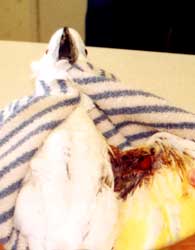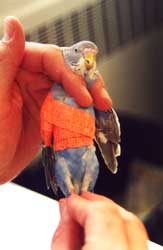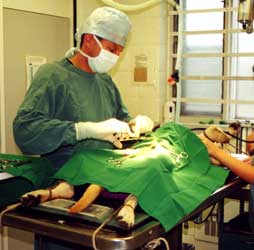My Day at the Vet’s Office Was Amazing

Not only did I learn a lot about veterinary medicine, but I met Casey, the umbrella cockatoo.
This is not your run-of-the-mill bird. Casey speaks in short sentences, having an intelligence almost equivalent to your five-year-old brother or sister. Unfortunately, he has developed an obsessive-compulsive personality disorder, which causes numerous challenges for his owner and himself. Due to his rather weird behaviour, Casey requires much psychotherapy and medication. Strange, repetitive body actions cause him to hurt himself, which worries his owners constantly.
 Enter Dr. Markus Luckwaldt, a veterinarian practitioner, who specializes in small animals, primarily avian and exotic animals. Not only is Casey in excellent hands, but so is his owner, Paul Smith, who is immediately put at ease through the compassion and understanding demonstrated by this veterinarian. Now I must say, Casey is not actually a small bird, and I too needed reassurance from the vet that all was fine as three adults and an uncaged cockatoo crammed into the examining room.
Enter Dr. Markus Luckwaldt, a veterinarian practitioner, who specializes in small animals, primarily avian and exotic animals. Not only is Casey in excellent hands, but so is his owner, Paul Smith, who is immediately put at ease through the compassion and understanding demonstrated by this veterinarian. Now I must say, Casey is not actually a small bird, and I too needed reassurance from the vet that all was fine as three adults and an uncaged cockatoo crammed into the examining room.
“Look at your beautiful feathers, Casey, and how gorgeous you look. It’s okay big guy. You are being a very good boy, Casey,” said the doctor while he closely examined Casey’s wing, which was chewed to the bone, exposing open, red sores. This was caused by excessive over-preening and indicates a bird who is never happy with the state of his feathers, a bad hair day taken to extremes! For good measure, the nose is cleaned (the contents of which are fed back to Casey to develop trust between vet and pet) and dentistry work is performed in and around the mouth and beak.
Watching the interactions between pet, owner, and doctor I was immediately struck by the high standard of communication skills required by the veterinarian in dealing with both humans and animals. Animals, I am told, pick up insincerity and uncertainty faster than humans. The vet’s role reminded me of a quarterback, who determines the strategy and game plan for all the players who are part of the same team.
A Career in Veterinary Medicine
So you think you’d like to be a veterinary doctor and you love animals? That’s a start, but it is only a start if you are interested in a career in veterinary medicine. Veterinarians are much more than people with a fondness for animals. A veterinarian is a doctor of animal health who has trained at a university for at least six years, and is licensed to provide medical and surgical care for animals. He or she can practice veterinary medicine in a number of fields.
As Dr. Luckwaldt told me, “A vet is a person who not only takes something that is broken and fixes it, but takes something that is living and breathing and returns it to better health. There is personal satisfaction and financial reward, there is an owner who is appreciative, a pet or animal who feels better and new relationships that are established.”
The day-to-day work of veterinarians involves examining animals, making diagnoses, doing blood tests or x-rays, treating diseases or injuries, performing surgery, and preventing animal illness through vaccination. Vets educate human owners about how to breed, feed, and care for their animals. They might also be called upon to help very old, sick animals die in a relatively pain-free manner. This is called euthanasia, and is viewed by vets as a sort of privilege or honour given to them in order to allow animals a peaceful death, when the time is right.
 Vets can specialize in the care and treatment of either small or large animals. Those who deal with small animals such as dogs, cats, birds, or reptiles usually work in cities, and have owners brings their animals to a clinic or office. Large animal veterinarians who work with horses, cows, pigs, and other farm animals often have a mobile practice, visiting farms and travelling all over the countryside.
Vets can specialize in the care and treatment of either small or large animals. Those who deal with small animals such as dogs, cats, birds, or reptiles usually work in cities, and have owners brings their animals to a clinic or office. Large animal veterinarians who work with horses, cows, pigs, and other farm animals often have a mobile practice, visiting farms and travelling all over the countryside.
Dr. Luckwaldt told me fascinating stories about his city practice. There was “Pinky,” the hedgehog who had a massive neck tumour, the python with pneumonia, the fruit bat from the Science Centre, the anorexic guinea pig, the domesticated pigeon, and on and on. This is one vet who loves his work and finds his patients and owners fascinating and funky.
Some vets work with companies that develop and produce food or drugs to keep animals healthy. Others are employed by the government to inspect livestock for diseases. Some even take part in medical research projects that use animals as test subjects.
About 75% of Canadian veterinarians work in small, large, or mixed animal practice. Approximately 10% of veterinarians work for some level of government, another 5% are in teaching and research work and a further 5% would hold a variety of related positions in the industry.
Incomes vary depending upon the type and size of the practice and the community served. In addition to the personal satisfaction of making a worthwhile contribution to the community, most veterinarians have an income above the national average annual salary. The starting salary for a new vet in private practice is usually between $40,000 and $50,000.
Educational Requirements
 You can start now to prepare for a career in veterinary medicine. A student who is interested in becoming a veterinarian should select courses in science as early as high school, and discuss details for a suitable academic program with a guidance counsellor. Science courses such as biology, chemistry, and physics form a good foundation. Optional courses in humanities and social sciences are also recommended, as well as a strong background in mathematics. If working in a clinic and setting up your own private practice interests you, then it would be wise to consider taking courses in business administration.
You can start now to prepare for a career in veterinary medicine. A student who is interested in becoming a veterinarian should select courses in science as early as high school, and discuss details for a suitable academic program with a guidance counsellor. Science courses such as biology, chemistry, and physics form a good foundation. Optional courses in humanities and social sciences are also recommended, as well as a strong background in mathematics. If working in a clinic and setting up your own private practice interests you, then it would be wise to consider taking courses in business administration.
Practical experience working with animals is always an excellent way to get your feet wet and gain valuable insight into the profession. It’s hands-on learning, and this is priceless.
To obtain the degree of Doctor of Veterinary Medicine (DVM), a minimum of six years of university education is required. This involves two years of pre-veterinary study at a regular university, followed by four years of courses in veterinary medicine at one of the four Canadian veterinary colleges. Excellent websites for veterinary schools and organizations can be found at: netvet.wustl.edu/vetorg.htm. The Canadian Veterinary Medical Association, situated in Ottawa, can be found at: www.canadianveterinarians.net.
There are four universities that offer Doctor of Veterinary Medicine programs in Canada. They are: University of Saskatchewan (Saskatoon); University of Guelph (Ontario); University of Montreal (Quebec); and the Atlantic Veterinary College (Charlottetown, Prince Edward Island).
For information on US colleges that offer veterinary programs:
www.aavmc.org
Related Jobs
You don’t have to limit yourself within this profession. There are many related jobs. Why not look into positions such as: animal breeder, animal caretaker, animal trainer, farmer, marine biologist, pet groomer, veterinary technician, veterinary assistant, clinic receptionist, animal attendant, zoologist, or zookeeper.
The Ideal Pet Veterinarian
If I could be so bold as to put words into Casey’s beak, I’d venture to guess that, for him, the ideal vet would have a genuine sensitivity toward, and understanding of, owners and animals. The vet would have strong communication skills, would work well under pressure, and not shy away from hard work and long hours. The ideal vet would demonstrate good decision-making skills combined with compassion and a good “bedside manner.”
Your vet is your friend, connected to the owner and animal in what is hopefully a long, healthy, and trusting relationship.
Future Expectations
The demand for veterinarians in all fields will continue. The veterinarian of the future will need to adapt and keep pace with technology and the many new advances in medical research.
Veterinary medicine, similar to human medicine, is continually confronting change and exploring alternative and complimentary methods of treatment for animals. Today, in some parts of the country, there are centres offering animals homeopathy, herbal supplements, organic foods, touch massage, and mind-body relaxation.
Don’t we all know pets, and their owners, who could benefit from such treatment centres!
Casey left the clinic in a much calmer mood and more content with life in and out of his cage. The relieved owner had Casey’s new medication in hand, and a revised treatment plan to follow. The vet had taken care of everyone’s physical and emotional needs.
It was a job well done, as Casey was heard saying upon leaving the clinic, “Thanks a lot Doc”.

hi, hi, hi
↓Hi
↓